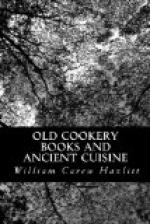It appears to have been usual for the farmer at that date to allow his hinds roast meat twice a week, on Sundays and on Thursday nights; but perhaps this was a generous extreme, as Tusser is unusually liberal in his ideas.
Tobias Venner, a Somersetshire man, brought out in 1620 his “Via Recta ad Vitam Longam.” He was evidently a very intelligent person, and affords us the result of his professional experience and personal observation. He considered two meals a day sufficient for all ordinary people,—breakfast at eleven and supper at six (as at the universities); but he thought that children and the aged or infirm could not be tied by any rule. He condemns “bull’s beef” as rank, unpleasant, and indigestible, and holds it best for the labourer; which seems to indicate more than anything else the low state of knowledge in the grazier, when Venner wrote: but there is something beyond friendly counsel where our author dissuades the poor from eating partridges, because they are calculated to promote asthma. “Wherefore,” he ingenuously says, “when they shall chance to meet with a covey of young partridges, they were much better to bestow them upon such, for whom they are convenient!”
Salmon, turbot, and sturgeon he also reckoned hard of digestion, and injurious, if taken to excess; nor does he approve of herrings and sprats; and anchovies he characterises as the meat of drunkards. It is the first that we have heard of them.
He was not a bad judge of what was palatable, and prescribes as an agreeable and wholesome meal a couple of poached eggs with a little salt and vinegar, and a few corns of pepper, some bread and butter, and a draught of pure claret. He gives a receipt—the earliest I have seen in print—for making metheglin or hydromel. He does not object to furmety or junket, or indeed to custards, if they are eaten at the proper seasons, and in the middle or at the end of meals. But he dislikes mushrooms, and advises you to wash out your mouth, and rub your teeth and gums with a dry cloth, after drinking milk.
The potato, however, he praises as nutritious and pleasant to the taste, yet, as Gerarde the herbalist also says, flatulent. Venner refers to a mode of sopping them in wine as existing in his time. They were sometimes roasted in the embers, and there were other ways of dressing them. John Forster, of Hanlop, in Bucks, wrote a pamphlet in 1664 to shew that the more extended cultivation of this root would be a great national benefit.
Venner, who practised in the spring and autumn at Bath as a physician, had no relish for the poorer classes, who did not fare well at the hands of their superiors in any sense in the excellent old days. But he liked the Quality, in which he embraced the Universities, and he tenders them, among other little hints, the information that green ginger was good for the memory, and conserve of roses (not the salad of roses immortalised by Apuleius) was a capital posset against bed-time. “A conserve of rosemary and sage,” says he, “to be often used by students, especially mornings fasting, doth greatly delight the brain.”




